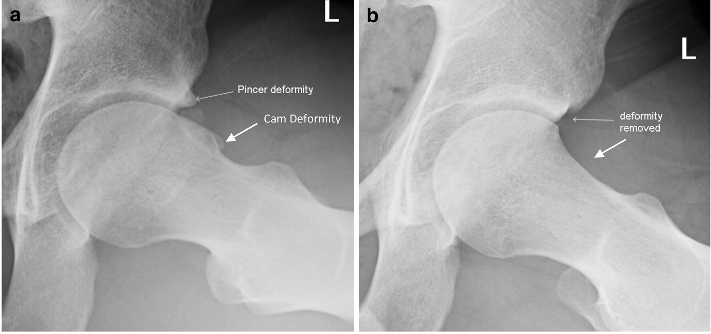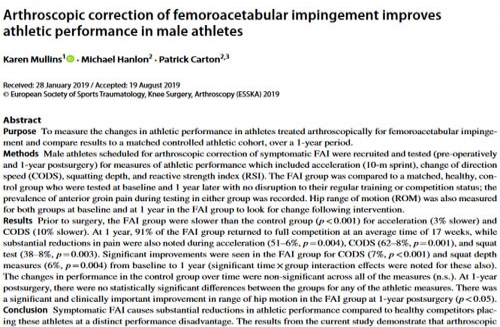Arthroscopic correction of femoroacetabular impingement improves athletic performance in male athletes

Karen Mullins1 · Michael Hanlon2 · Patrick Carton2,3
Knee Surgery, Sports Traumatology, Arthroscopy
Purpose
To measure the changes in athletic performance in athletes treated arthroscopically for femoroacetabular impinge- ment and compare results to a matched controlled athletic cohort, over a 1-year period.
Methods
Male athletes scheduled for arthroscopic correction of symptomatic FAI were recruited and tested (pre-operatively and 1-year post-surgery) for measures of athletic performance which included acceleration (10-m sprint), change of direction speed (CODS), squatting depth, and reactive strength index (RSI). The FAI group was compared to a matched, healthy, control group who were tested at baseline and 1 year later with no disruption to their regular training or competition status; the prevalence of anterior groin pain during testing in either group was recorded. Hip range of motion (ROM) was also measured for both groups at baseline and at 1 year in the FAI group to look for change following intervention.
Results
Prior to surgery, the FAI group were slower than the control group (p < 0.001) for acceleration (3% slower) and CODS (10% slower). At 1 year, 91% of the FAI group returned to full competition at an average time of 17 weeks, while substantial reductions in pain were also noted during acceleration (51–6%, p = 0.004), CODS (62–8%, p = 0.001), and squat test (38–8%, p = 0.003). Significant improvements were seen in the FAI group for CODS (7%, p < 0.001) and squat depth measures (6%, p = 0.004) from baseline to 1 year (significant time × group interaction effects were noted for these also). The changes in performance in the control group over time were non-significant across all of the measures (n.s). At 1-year post-surgery, there were no statistically significant differences between the groups for any of the athletic measures. There was a significant and clinically important improvement in range of hip motion in the FAI group at 1-year post-surgery (p < 0.05).
Conclusion
Symptomatic FAI causes substantial reductions in athletic performance compared to healthy competitors plac- ing these athletes at a distinct performance disadvantage. The results from the current study demonstrate that arthroscopic correction (including labral repair) in athletes with symptomatic FAI, reduces pain and restores athletic performance to a level which is comparable to healthy athletes, at 1 year.
Level of evidence II.
Keywords Femoroacetabular impingement · FAI · Arthroscopy · Hip injury · Athletes · Sports injury · Athletic performance
Click the link below to read the full article:







